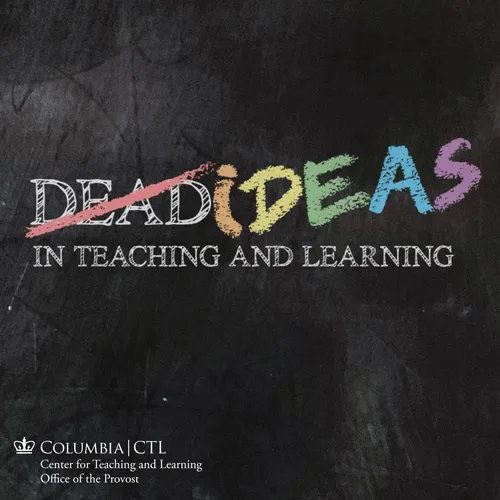
Dead Ideas in Teaching and Learning
Dead Ideas in Teaching and Learning is a podcast from the Columbia University Center for Teaching and Learning. Our mission is to encourage instructors, students, and leaders in higher education to reflect on what they believe about teaching and learning.
- Update frequency
- every 13 days
- Average duration
- 31 minutes
- Episodes
- 58
- Years Active
- 2020 - 2024

A Neuroscientist’s Perspective on Student Engagement with Alfredo Spagna
What does engagement require of your students behaviorally, emotionally, and cognitively? Why is it essential to get to know your students, and how can you do this in large classes? Hear advice from …

How the Science of Learning Can Be Leveraged for Change with Kelly Hogan and Viji Sathy
Kelly Hogan and Viji Sathy, award winning instructors at the University of North Carolina at Chapel Hill and authors of the book, Inclusive Teaching: Strategies for Promoting Equity in the College Cl…

Why Are Dead Ideas So Persistent? A Conversation with John Mahoney
Despite the large body of research on effective teaching and learning practices, such research is often ignored or unknown by instructors and students. Instead, many “dead ideas” in teaching and lear…

Rigor and Assessment from the Student Point of View
How can assessment motivate students to focus on learning as opposed to grades? Can it still be rigorous if it’s not high stakes exams? Today we speak with Maryam Pate and Olivia Schmitt, two Columbi…

Rigor as Skill Building with Larry Jackson
Rigor as Skill Building with Larry Jackson
How can academic rigor be defined and enacted in humanities courses to promote learning and skill building? How can we engage and challenge our students whil…

Rigor as Equity with Jean-Marie Alves-Bradford and Hetty Cunningham
What does rigor look like in a healthcare setting? How can instructors achieve both excellence and equity in teaching in such a high-stakes area as healthcare education? In this episode, we speak wit…

Rigor as Liberation with Elwin Wu and Kelsey Reeder
In today’s episode, we approach the topic of rigor from the lens of social work instruction with Elwin Wu, Professor at Columbia University’s School of Social Work (CSSW), and Kelsey Reeder, a Clinic…

Rigor as Engagement with David Helfand
What does rigor mean in a science course? How can it encourage learning and engagement? And how can we support students while maintaining standards of excellence? In this episode, we dig further into…

Rigor as Inclusive Practice with Jamiella Brooks and Julie McGurk
Is rigor necessary to teach more inclusively? What is a deficit ideology and how does it affect students? In this episode, Jamiella Brooks, director of student equity and inclusion initiatives at the…

You Can’t Ignore That a Pandemic Happened with John Warner
John Warner, educator and author of the Inside Higher Ed blog, “Just Visiting”, wrote in a May 2022 post titled “You Can’t Ignore That a Pandemic Happened”: “I am concerned that the understandable de…

Two Years Later: Learning through a Pandemic with Two Columbia Undergraduate Students
Over the past two years, Columbia students have made multiple transitions between online, hybrid, and in-person learning during the pandemic. In today’s episode, Emma Fromont, a senior at Columbia’s …

Minding Bodies: How Physical Space, Sensation, and Movement Affect Learning with Susan Hrach
Today we speak with Susan Hrach, author of the book Minding Bodies: How Physical Space, Sensation, and Movement Affect Learning (2021), which “shifts the focus of adult learning from an exclusively m…

The Impact of Student Perceptions of Instructor Authority on Resistance to Inclusive Teaching with Chavella Pittman and Thomas Tobin
Today we speak with Drs. Chavella Pittman and Thomas Tobin, authors of the article “Academe Has a Lot to Learn about How Inclusive Teaching Affects Instructors”, published in The Chronicle of Higher …

Dead Ideas About Anti-Racist Pedagogy with Frank Tuitt
What is anti-racist pedagogy and how is it different than inclusive teaching? Is it a new pedagogy? How can instructors enact anti-racist practices in the classroom, and what structural changes shoul…

Teaching Development at Its Best: A Graduate Student Reflects
Columbia University graduate student, Aleksandra Jakubczak, shares her reflections on her journey to become a more informed and confident teacher, and how that journey took her so much further than s…

The Damaging Myth of the Natural Teacher: The Story Behind The Story with Beth McMurtrie
In October 2021, Beth McMurtrie, senior writer for The Chronicle of Higher Education, wrote an article titled “The Damaging Myth of the Natural Teacher”. The piece explores how, despite decades of re…

Speaking from the Heart: An Instructor and Her Student Reflect
Speaking from the Heart: An Instructor and Her Student Reflect
with Dr. Karen Phillips and Yarin Reindorp
Today we speak with Yarin Reindorp, a junior in Columbia’s School of General Studies, and her…

The Power of Blended Classrooms with Denise Cruz
In 2020, Denise Cruz, Professor of English and Comparative Literature at Columbia, worked with the CTL through a Provost’s Innovative Course Design Grant to transform her large lecture course in Asia…

Learning Innovation and the Future of Higher Education with Joshua Kim and Edward Maloney
Today we speak with Joshua Kim, Director of Online Programs and Strategy at Dartmouth College, and Edward Maloney, Executive Director of The Center for New Designs in Learning and Scholarship at Geor…

Convergent Teaching with Aaron Pallas and Anna Neumann
While much public discourse argues over the value and the future of higher education—whether it really “pays off” or how we can leverage technological tools and big data—what’s often missing from the…